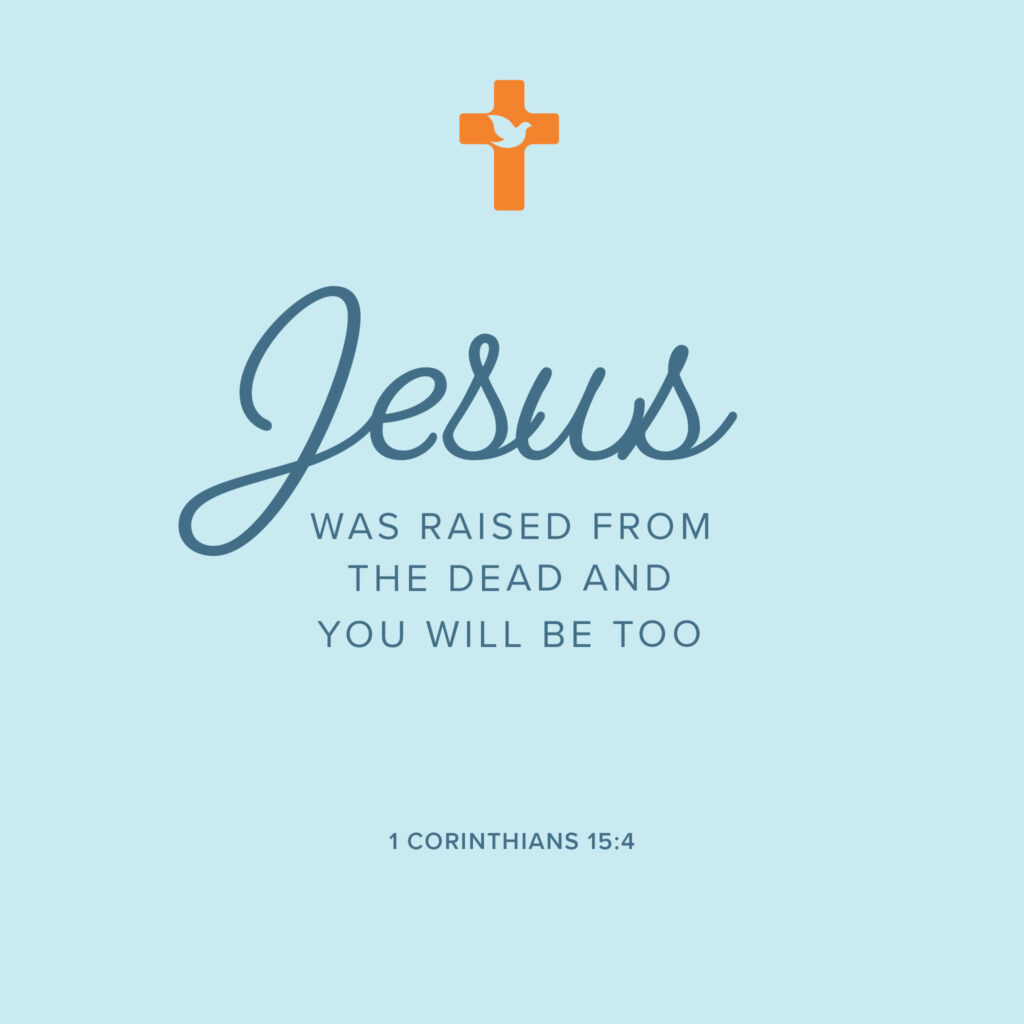April 9, 2023
Pastor Gunnar Ledermann
1 Corinthians 15:1-11
1 Corinthians 15:1-11
1 Now, brothers and sisters, I want to remind you of the gospel I preached to you, which you received and on which you have taken your stand. 2 By this gospel you are saved, if you hold firmly to the word I preached to you. Otherwise, you have believed in vain.
3 For what I received I passed on to you as of first importance: that Christ died for our sins according to the Scriptures, 4 that he was buried, that he was raised on the third day according to the Scriptures, 5 and that he appeared to Cephas, and then to the Twelve. 6 After that, he appeared to more than five hundred of the brothers and sisters at the same time, most of whom are still living, though some have fallen asleep. 7 Then he appeared to James, then to all the apostles, 8 and last of all he appeared to me also, as to one abnormally born.
9 For I am the least of the apostles and do not even deserve to be called an apostle, because I persecuted the church of God. 10 But by the grace of God I am what I am, and his grace to me was not without effect. No, I worked harder than all of them—yet not I, but the grace of God that was with me. 11 Whether, then, it is I or they, this is what we preach, and this is what you believed.
I noticed something hidden among the Easter lilies. If you can see it point to it. It is a blue Easter egg. Sounds like there is something inside. Yum, it is a piece of chocolate candy. Easter eggs bring us a lot of joy whether we are the ones filling them with candy and hiding them or finding them to enjoy whatever treasure is inside. Yet, the fun of Easter eggs is short lived. And when we are young, it may feel like a crisis when the search for eggs is over, and more so when the candy inside is all gone.
There are real crises in our world, and running out of Easter candy is not one of them. Although, the number of tears and volume of crying might make you think otherwise. There are many instances in our daily lives when do not use words accurately to describe events like calling it a crisis when the Easter candy runs out or saying that we love pizza or that it took half a day to drive to downtown Dallas, well maybe that last one is accurate. There are real crises in the world affecting you and millions, if not billions of other people. I do not need to list them because you know them so well. We have had conversations about them, and I have seen your posts about them. I have seen the anger or despair they cause you thinking about how they are affecting you and the next generation.
Those things that are true crises affect us so deeply because they affect our lives. A crisis threatens to alter how you live your life and even cut your life short. We often talk about death as Christians, not for the shock value, but because it is so inclusive. Death is one of the few things that is inclusive of all people. Death is a crisis moment, and if you say that it is not, then you need to have a good reason for saying so. In our Gospel reading from Matthew 28, some women were living in a crisis moment. Their teacher, leader, healer, even friend and supposed Savior was betrayed by one of his own twelve disciples, and overnight had been condemned to agonizing death on a cross, one of the top torture devices ever implemented, on false charges. Jesus died on a Friday, and the women came to his tomb after the Sabbath at dawn on Sunday. When they arrived, they were met by an angel and 5 The angel said to the women, “Do not be afraid, for I know that you are looking for Jesus, who was crucified. 6 He is not here; he has risen, just as he said.” When the angel spoke to the women in crisis mode, they did not immediately snap out of their fear. They heard the clear message of the angel and saw the empty tomb but did not fully grasp what had happened. Then angel told them to go tell the disciples,
8 So the women hurried away from the tomb, afraid yet filled with joy, and ran to tell his disciples. 9 Suddenly Jesus met them. “Greetings,” he said. They came to him, clasped his feet and worshiped him. 10 Then Jesus said to them, “Do not be afraid. Go and tell my brothers to go to Galilee; there they will see me.”
Matthew 28:8-10
Again, the women were a caught off guard and afraid, but Jesus himself met them. He was upright and talking with them. They were filled with joy, but it was not time to sit and talk. Others were still in crisis mode and needed to hear what had happened, so Jesus sent the women to tell the disciples what had happened and where to meet Jesus who was raised from the dead.
Jesus was raised from the dead is a message that still brings fear. Some people are afraid their lifestyle will have to change when they hear about Jesus. Some people are afraid because they have not been treated well by people who follow Jesus. Some people fear being separated from their family or culture because of Jesus. Sometimes this fear of Jesus causes hostility. In our New Testament reading from 1 Corinthians 15, Paul whom God inspired to write this letter openly spoke about the time in his life when he was filled with hostility and was dedicated to eradicating anyone who believed in or shared the message of Jesus who was raised from the dead, he wrote, 9 For I am the least of the apostles and do not even deserve to be called an apostle, because I persecuted the church of God. Paul lived in crisis mode while persecuting the church of God. For him, the message of Jesus who was raised to life was an attack on his religion, his people, his purpose, his identity, etc. Feeling threatened, Paul waged war against anyone who shared that message. Paul wanted the Jesus who was raised from the dead crisis to end, so that he could go back to his life without Jesus. But even if Paul had put to death everyone who believe and shared the message of Jesus who was raised from the dead, he would still not have an answer to the most inclusive crisis, death. Paul’s answer to death was to live as good as possible, but even he could not claim that he had lived every moment of his life doing good. So, he would die and face God’s judgment as he would have known from what was written in Old Testament in Ezekiel 18, 20 The one who sins is the one who will die.
You need an answer to the same crises as Paul. You need a reason to not be afraid, an answer for the bad things you have done or said or thought, you need an answer to the many crises affecting our world and you need a good reason not to be afraid of the moment you are cut off from interaction and connection with this world and people, an answer for death. The answer to all these crises was put in front of Paul, just like it was with the women who came to the tomb to find an angel telling them that Jesus was alive. Jesus appeared to Paul on the way to Damascus a few years after he was raised to life in the early 30s A.D. Paul was put face to face with Jesus who was raised from the dead. The kind of power to bring Jesus back from the dead only belongs to God. And God used his power to give life to give life to Jesus and Paul, and you.
Grace was the reason God chose to use his power. In our New Testament reading from 1 Corinthians 15, Paul wrote, 10 But by the grace of God I am what I am, and his grace to me was not without effect. God’s grace is his unconditional love. God does not first look at who we are in deciding to love us, he simply loves us. He even loved Paul changing his heart from fear to faith. By the grace of God, Paul became a missionary for Christ spreading the message of Jesus who was raised from the dead to people throughout the Mediterranean. And whether he was met with fear or joy, he continue to share this message recorded in 1 Corinthians 15,
3 For what I received I passed on to you as of first importance: that Christ died for our sins according to the Scriptures, 4 that he was buried, that he was raised on the third day according to the Scriptures, 5 and that he appeared to Cephas, and then to the Twelve. 6 After that, he appeared to more than five hundred of the brothers and sisters at the same time, most of whom are still living, though some have fallen asleep. 7 Then he appeared to James, then to all the apostles, 8 and last of all he appeared to me also, as to one abnormally born.
1 Corinthians 15:3-7
Again, Paul had seen Jesus who was raised from the dead. The message Paul shared centered on this truth. And the proof of Jesus’ resurrection was in his many appearances to many people. His resurrection was also expected by many who died before Jesus was raised from the dead because it had been written in the Scriptures. One example comes from our Old Testament reading from Jonah 2, Jonah recorded these words from his three days entombed inside the belly of a great fish, 6 To the roots of the mountains I sank down; the earth beneath barred me in forever. But you, Lord my God, brought my life up from the pit. These words applied to Jonah whom God allowed to miraculously survive three days inside a fish before being vomited up on land. Yet, these words also applied to Jesus who over 700 years after Jonah was buried in a tomb for three days, then was brought back from the dead as Jesus had said in Matthew 16, 4 “A wicked and adulterous generation looks for a sign, but none will be given it except the sign of Jonah.”
Sin causes crises. God did not mean for your life to be filled with crises. He created life to be good, to be characterized by joy and love. The Bible uses the word sin to describe our decisions to go against God’s plan. We all have a conscience that tells us right and wrong, and sometimes we listen to it, but sometimes we do not. Even though we recognize decisions as sinful or hurtful, we still do them. Paul in another one of his letters, Romans, wrote in Romans 5, 12 Therefore, just as sin entered the world through one man, and death through sin, and in this way death came to all people, because all sinned. Paul referenced Adam, the first human, and his decision to go against God. That sin has been passed to every human being, and the punishment for that sin is death. That sin was not given to Jesus because the Holy Spirit allowed the virgin Mary to conceive and give birth to Jesus. Jesus did not deserve to die for sin. Instead, he was punished for our sins. Because of Jesus who was raised from the dead, when you die, you do not have to be afraid of God’s judgment. You are forgiven through Jesus.
When you are in crisis, you put your faith in something to get you through it. When you get in a car accident you call 911 putting your faith in the first responders. When you are out of Easter candy you put your faith in mom, dad, grandma, grandma, aunt, uncle, etc. to get you more. Whether you are in a crisis now or not, you will face the crisis of death, and you cannot be neutral to it like Switzerland. Switzerland is a neutral country, which I get it that they do not choose a side to fight with, and I see how that has benefits. On the other hand, if evil is happening and someone does not stop it, they are no longer neutral. God was not neutral against evil, he fought against the evil of sin and death himself and won.
The reliability of Jesus, his work to save us, his gift of life, his power, grace and love all rely on the resurrection. Paul began 1 Corinthians 15 with these words, 1 Now, brothers and sisters, I want to remind you of the gospel I preached to you, which you received and on which you have taken your stand. 2 By this gospel you are saved, if you hold firmly to the word I preached to you. Otherwise, you have believed in vain. Jesus died to forgive the sins of the world, that is the gospel message. The proof that you can trust that message is the resurrection. The reason we have joy and confidence on Easter is that Jesus was raised from the dead and you will be too. Oh yea, there is still the white egg. Let us see what is inside. It is empty. He is risen! Amen.




